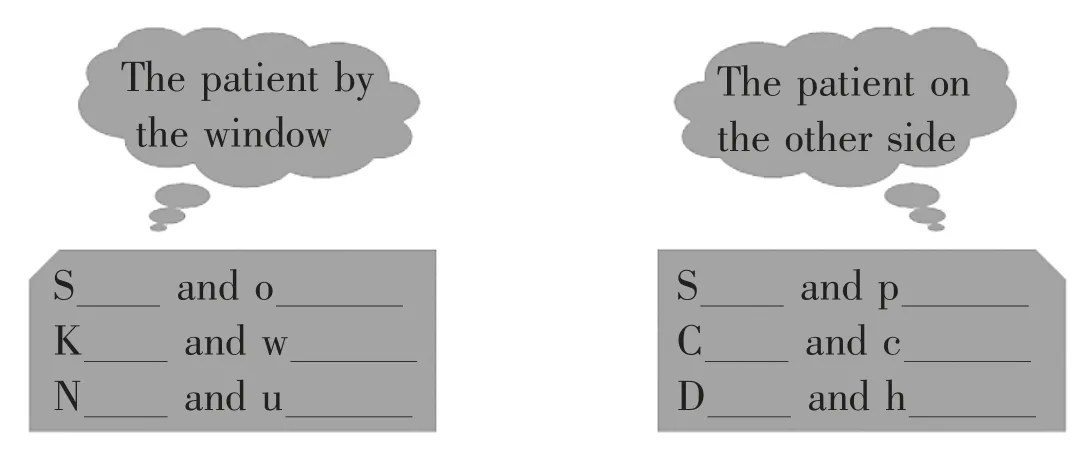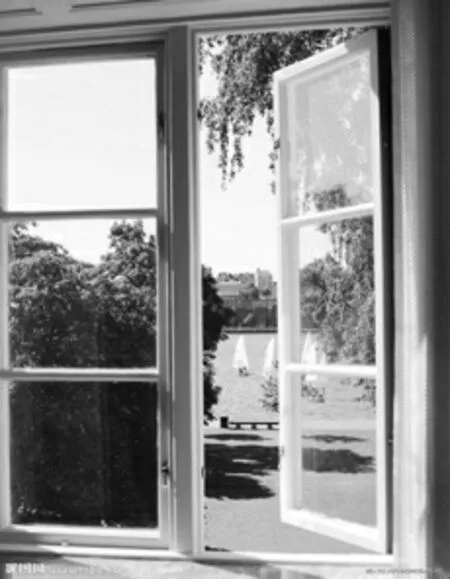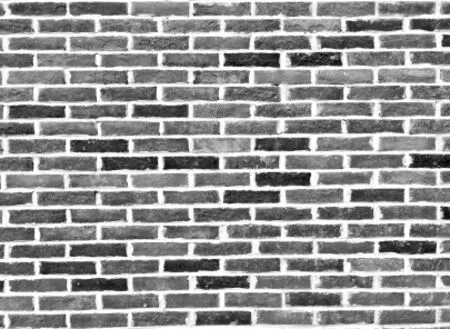The Hospital Window
2020-06-18徐奚潇
Step 1 感知·阅读导航
话 题 导 入
本文为澳大利亚作家泰格特的短篇小说《窗》,场景和人物的设计都极为简单。 在单调乏味的病房里,一个靠窗的病人给他不靠窗的病友讲述着窗外的美景。 前者虽然身患重病,但依旧无比热爱生活,觉得应该将窗外的生机与快乐和他的病友分享;而后者却不肯满足于此,他对靠窗病床的渴望与日俱增,最终在这种欲望的驱使下,他对挣扎求救的病友置之不理而导致其死亡,以卑鄙的手段得到了他梦寐以求的靠窗位置。 但生活和他开了一个无比公平的玩笑,当他探出头迫不及待地享受窗外风景时,却发现窗外只有白白的一面墙。
小说内涵丰富,意蕴深刻。 一扇小小的窗户,揭示了只有纯洁的心灵、高尚的品格才能用心描绘绚丽的风景,相反,自私和卑劣的人性只能换来黑暗与苦涩。
本文通过“窗”这个微型主题集中探讨了人性的美丑和善恶。 全文568词,建议用时10分钟。
阅读目标
1. 思考小说情节的主线(开端—发展—高潮—结尾)对推动故事情节所起的作用;
2. 通过对故事梗概的理解,概括归纳两个病人的不同性格特点;
3. 结合文章有关情节,分析文章中“窗”的丰富内涵,并总结出文章的主题。
阅读扫障
1. enliven /ɪnɪlaɪvn/ v. 使更有生气
2. picturesque /'pɪktʃəɪresk/ adj. 美丽的;古色古香的
3. ferment /fəɪment/ v. (使)发酵
4. resentment /rɪɪzentmənt/ n. 愤恨;不满
5. brood /bruːd/ v. 忧思
6. grope /ɡrəʊp/ v. 摸索;探寻
7. fuss /fʌs/ n. 紧张不安;大惊小怪;过分激动
Two men, both seriously ill, occupied the same hospital room. One man was allowed to sit up in his bed for an hour each afternoon to help drain the fluid from his lungs. His bed was next to the room's only window. The other man had to spend all his time flat on his back.
The men talked for hours on end. They spoke of their wives and families, their homes,their jobs, their involvement, and where they had been on vacation.
Every afternoon when the man in the bed by the window could sit up, he would pass the time by describing to his roommate all the things he could see outside the window. The man in the other bed began to live for those one-hour periods where his world would be broadened andenlivenedby all the activity and color of the world outside.
The window overlooked a park with a lovely lake. Ducks and swans played on the water while children sailed their model boats. Young lovers walked arm in arm amidst flowers of every color and a fine view of the city skyline could be seen in the distance. As the man by the window described all this in exquisite detail, the man on the other side of the room would close his eyes and imagine thepicturesquescene.
One warm afternoon the man by the window described a parade passing by. Although the other man couldn't hear the band, he could see it in his mind's eye as the gentleman by the window portrayed it with descriptive words.
Unexpectedly, an alien thought entered his head: Why should he have all the pleasure of seeing everything while I never get to see anything? It didn't seem fair. As the thoughtfermentedthe man felt ashamed at first. But as the days passed and he missed seeing more sights,his envy eroded intoresentmentand soon turned him sour. He began tobroodand he found himself unable to sleep. He should be by that window—that thought now controlled his life.
Late one night as he lay staring at the ceiling, the man by the window began to cough.He was choking on the fluid in his lungs. The other man watched in the dimly lit room as the struggling man by the windowgropedfor the button to call for help. Listening from across the room he never moved, and never pushed his own button which would have brought the nurse running. In less than five minutes the coughing and choking stopped, along with the sound of breathing. Now there was only silence—deathly silence.
The following morning the nurse on a day shift arrived to bring water for their baths. When she found the lifeless body of the man by the window, she was saddened and called the hospital attendants to take it away—no works, nofuss.
As soon as it seemed appropriate, the other man asked if he could be moved next to the window. The nurse was happy to make the switch, and after making sure he was comfortable, she left him alone.
Slowly, painfully, he propped himself up on one elbow to take his first look. Finally, he would have the joy of seeing it all himself. He strained to slowly turn to look out of the window beside the bed.
It faced a blank wall.
Step 2 理解·文本解读
目标呈现
1. Understand the structure.


What they saw outside the window

imagined

actual
2. Analyse the characters of the two patients.3. Try to work out two examples of dialectics from the text.

【点石成金】知微见著,小中见大,一扇小小的窗户充溢着世态的炎凉、人情的冷暖。 结尾处“他看到的只是光秃秃的一堵墙”,戛然而止,出人意料,却因其揭示了深刻的社会主题,而又在情理之中。 同时通过“窗外美景”凸显纯洁心灵、高尚人格和伟岸形象,而“一堵白墙”则批驳自私和卑劣的人性,虚实结合,动人心弦。
Step 3 运用·读写整合
主旨新探
1. Why did the author employ “The Hopital Window” as the title?
2. What did the author try to convey in the text?

类文鉴赏
1. What genre of literature can the text be categorized into?

2. Compared with The Hospital Window, what does this text try to convey?

Step 4 提升·素养建构
写作技巧
It faced a blank wall. Why is the ending so special?

改写·续写
Imagine the man by the window passed away peacefully without struggling or asking for help. The other man therefore doesn't have to be pictured as jealous, sour and despicable. What is your version of the story? The modified story is as follows:
There were two men, both seriously ill, who shared the same hospital room. One man got a seat next to the room's only window. The man was also allowed to sit up in his bed for an hour each afternoon to help him drain fluids from his lungs. The other man had to spend all his time lying flat on his back.
The two roommates quickly bonded and started talking for hours on end. They talked about their lives, their job, children and wives. One day the man on the other side of the window, expressed how he envied the man near the window. From that day the man near the window started describing all the things he could see outside the window.
The window overlooked a lovely park with a lake. Ducks played on the lake while children sailed their model boats. Young lovers walked arm in arm amidst flowers of every color and a fine view of the city skyline could be seen in the distance. The man on the other bed began to live for each hour when he could hear and visualize the world outside the hospital room. The one hour of every day would broaden his world and got enlivened by all the activity and color of the world outside.
One fine afternoon the man by the window described a parade which was passing by. Although the other man could not hear the band, he could visualize it as the man by the window vividly described.
Days and weeks passed by.
One morning, a nurse arrived to examine the condition of the two patients. She found the lifeless body of the man by the window. The man had peacefully embraced his death on his sleep. The nurse sadly called the hospital attendants to take the body away.
The other man grieved the death of his roommate. But, as the day passed by he started missing the way his roommate described the view out of the window. As soon as it seemed appropriate, the other man asked if he could be moved next to the window. The nurse was happy to make the switch.But as he propped himself up, slowly and painfully, on one elbow to take his first look at the real world outside, he was stunned by what he saw:
It faced a blank wall.

【点石成金】改写和续写是故事类文本阅读课的有效拓展方式之一,是激活学生形象思维能力和逻辑思维能力,考查学生语言综合运用能力的有效手段。 通过对情节的梳理、人物的分析、主旨的探究和语言的模仿,学生能在改写中尝试新视角,提升思维品质;在读后续写中加深对文章的理解。
Epilogue(尾声): There is tremendous happiness in making others happy, despite our own situations. Shared grief is half the sorrow, but happiness when shared, is doubled. “Today is a gift. That is why it is called The Present.”
